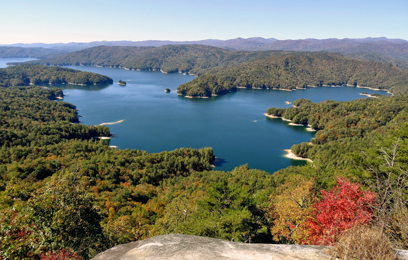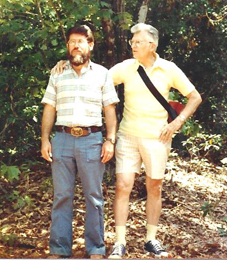Loving, leaving, and looking back

Photo courtesy femmeaufoyer2011.blogspot.com
The creation of Lake Jocassee, along with Lake Keowee, forever altered the Upstate landscape, eliminating the Horsepasture, a precious area where the Toxaway and Horsepasture rivers met.
Revisiting the Horsepasture
By Dr. Thomas Cloer, Jr.
Special to The Courier
When I see books now that show the stages of the massive Duke Energy project that created lakes Keowee and Jocassee, I feel a wave of melancholy sweep over me. Some of the fondest memories of my life were formed within the mountains, hollows, rivers and meadows that are now just putrid mud at the bottom of those reservoirs. The Horsepasture was that precious area where the Toxaway and Horsepasture rivers met. It was flat there, and livestock such as horses were pastured there at one time, thus its name.
One of the greatest thrills in my life was to spend a week-end fly fishing up the Horsepasture River from its junction with the Toxaway River. This was the very area called the Horsepasture by the natives of this region. The old gravel road was beside the Horsepasture River until Mill Creek and Bearcamp Creek joined the mighty headwaters of the Keowee. Where Bearcamp Creek joined the Horsepasture River, we often made our camp. The Horsepasture River left the road there and turned toward North Carolina. All is now sludge at the bottom of Lake Jocassee.
Loving the Horsepasture
In the 1960s, we would pile an old tent into a vehicle, grab a fishing pole and a few staple goods and we would go to paradise. My dad and I would fish day and night, at night by wading the Horsepasture River. We would carry an old lantern and set it on a rock to illuminate the area. Catfish and all species of trout hit at night. If a sudden rain muddied the waters, the catfish hit in daylight. The bullhead catfish from our mountain rivers was a delicacy unparalleled. After a catch of such, we would inevitably pump an old propane portable cook stove, light it and the smell would carry downriver toward the campers catching bullheads. Within minutes, the gang would be gathered, ready to eat.
There were several places Dad and I loved to fish. One was the stretch down Keowee River from the junction of the Horsepasture, Toxaway and Laurel Fork Creek to what was called Devil’s Hole. Dad and I would float on an old rubber raft, catch fish from every pool as we stopped for a while, get out, wade, fish, stretch our legs and eventually float all the way down to our take-out point at Devil’s Hole. We would have someone leave us at the old dangerous Toxaway River wooden bridge, just above where the Horsepasture River, Toxaway River and Laurel Fork Creek joined. Our pick-up team would then travel the old Horsepasture Road downriver to the Devil’s Hole. I well remember our last trip. We had caught a grand string of fish and were eager to eat.
It was mid-week, and after eating freshly caught fish, we decided we had better head back to civilization. We soon discovered that our old four-wheel-drive International Scout had a very flat tire. Not to worry, we of course had a spare. However, the spare had a slow leak and had lost nearly all its air. It did have a little, but there was another slight problem — no jack. No problem — I found an ax, and Dad said we could cut and use a strong pole as a lever and raise the vehicle. We placed some nice river rocks, now at the bottom of Lake Jocassee, in such a manner as to squeeze the long, strong sapling just under the frame of the old Scout and on top of the rocks. Three of us pushed the sapling downward, and the vehicle lifted its hind part. We put on the spare, and all eyes were on it as we let the weight back down. It was a poor excuse for an inflated tire. Dad said, “I hope that will at least take us back to civilization.” And it did, barely.
From New York to the Horsepasture
My wife, Elaine Kowalski Cloer, is a full-blooded Polish lady from Brooklyn, N.Y. Her grandparents were Polish immigrants who were admitted to America through Ellis Island. Her parents had never been camping, so I invited Elaine’s father, Conrad Kowalski, to camp with us, a group of ruffians, in the Horsepasture. Several from the sawmill in Pickens, where Dad was superintendent, would always want to go.
Conrad was astounded at the beauty and the wildness of the Jocassee Gorges. He was notably nervous as we crossed Toxaway River on the old wooden bridge with runners. The bridge had tilted significantly toward upstream from the raging currents of high waters. Conrad was stiff and looked straight ahead as I eased across the rickety old bridge. I told him at our camp, near the mouth of Bearcamp Creek, that I was going down the road beside Horsepasture River to fly fish in the river back upstream to camp. I told him he could follow me and watch if he wished.
I remember two of Dad’s millhands from the sawmill came beside Conrad, and I heard them clapping when I hooked a huge trout that was tail dancing. “That reminds me of popcorn popping!” the millhand called. When I looked up, I noticed my father-in-law was not with them. I figured he had gone back to camp to snack.
I fished until I caught a limit of trout. I sat and cleaned them while watching for Conrad to return. He didn’t show, so I gathered my net, creel and haversack of flies and headed toward camp. When I called at camp and Conrad didn’t answer, I began to get a little apprehensive. The weather was very hot and steamy, and Conrad had heart problems.
I walked on up Bearcamp Creek and heard a strange sound in the distance. I had never heard anything quite like it. At first, I thought it was someone in distress. As I approached more closely, I recognized singing, splashing and screeches of delight and joy. When I slipped and peeped into Bearcamp Creek, it was my father-in-law, naked as a jay bird standing knee deep and throwing ice water from the creek onto his face, chest and back. I will never forget the singing he was doing, intermittingly interrupted with screeches of delight as he splashed ice water on himself.
Dams made miles of those magical waters of the Jocassee Gorges lie still. I will never forget the screeches of delight from my late father-in-law. I’m glad I took him before he passed and before miles of the rivers stopped mesmerizing us with their rustling, roaring, and rowdy sounds, often intermingled with screeches of delight.
Leaving the Horsepasture
Another place in paradise was The Buzzard Roost on the Toxaway River, above where it joined the Horsepasture River. I remember well when we met several other friends there for a night of fishing and breakfast on the water. We planned to fish in the evening till dark for perch, trout and red eyes, and then fish till at least midnight for bullheads.
It was terribly steep going down to the river. “I hope it doesn’t come a late-night storm!” Dad exclaimed as I drove our old Scout toward the river. “We’d be in here for a while.”
I noticed what I thought was thunder up toward the North Carolina line. But we had come to fish. We hurried down the steep bank to the Toxaway and were soon throwing Georgia wigglers we had picked from beneath the leaves.
“I got him!” Dad called. “He feels heavy!”
Dad netted a big red eye from the river.
“That’s what we like about the South!”
At dusk, the first catfish bit. We started catching them and soon had a stringer full.
“I’ll start cleaning them, I said. “Who wants them for breakfast?”
“I do!” said a voice a little farther downriver.” “I do!” said another.
After cleaning fish and going back to our vehicle, I thought I heard thunder again.
It was now after midnight, and we all were exhausted. We ate a quick snack and were soon lying on the ground, some with sleeping bags, others not so fortunate. My late friend, Jerry Baker, who married my wife’s sister, was lying on top of his bag, already snoozing. We had a dim lantern. Suddenly, I felt the largest drop of water surely that had ever fallen from the sky — just one huge drop. Then, I saw one hit Jerry in the face. I remember Jerry was so exhausted that he just twitched his beard and moustache and kept snoozing. When the next one hit, the bucket emptied.
“”Let’s get to the top of the mountain!” I called to Jerry, Dad and the others. “We can eat breakfast over on Laurel Fork Creek!”
We slept in our vehicles on top of the mountain and met with the other members of our trip on Laurel Fork Creek for breakfast. The rain was over. We met near the location where the old five-log cabin once stood, where the old settler had used five logs that were so huge (yellow poplar) that he had enough height, from floor to ceiling, with only five logs.
As was the custom, we cooked fish right on the bank of Laurel Fork Creek. The late Mr. Claude Kinsey was always chosen as the cook. Claude loved to go with us to the Horsepasture. He was a gentle, lovely man, who smoked his pipe and grinned at our jokes. Claude had been a cook in the military, and he was darn good at it. I always loved him because of his gentle nature, and I always think of him when I see his descendants in Pickens. When Claude said the fish were ready, and the melons and tomatoes were sliced, the custom was for someone to return thanks. Dad was called upon to say grace. He normally spoke of how precious the moment was, with the wildness and the beauty of the gorges to remind us of how temporary we as humans were. Dad was right.
The Appalachian Mountains are ancient indeed, many millions of years old. Our beautiful brook trout had ancestors fanning in the Thompson River, Mill Creek and Bearcamp Creek when a carpenter from Nazereth was being tried and crucified in Jerusalem. The speckled trout were thriving in the Jocassee Gorges when men were straining and pulling to place another stone on the great pyramids of Egypt. The miniature speckled trout fry were finding the cold tributaries of the Jocassee Gorges to their liking when the Vikings were plundering parts of ancient Europe, and chasing monks into Irish roundhouses.
Looking Back
One year later, as the autumn sun lost intensity in an old campsite under hemlocks along Laurel Fork Creek, two old gentlemen in overalls spun yarns as they sat and leaned against trees near where the old five-log cabin once stood. A Treeing Walker and a Redbone Coon Hound mourned on their leashes, eager to run an old ranger raccoon up one of the smaller streams to the top of a giant hemlock. The old gentlemen, two old coon-hunting buddies of mine, talked about life as it once was in the Horsepasture, how old man Chappell lived on one side of the river, and his wife lived in another house on the opposite side. One of the old gentlemen doing our cooking was a retired moonshiner, who loved to boil squirrels and raccoon off the bone in a big black cast-iron pot, and then bake them with potatoes in a giant black skillet. The other old gentleman was a sawmiller.
“I never knowed a place I loved more than the Horsepasture, Buzzard Roost or Devil’s Hole,” said the old moonshiner. “You reckon Heaven will allow coon hunting and bullhead cat fishin’?”
This was just the opening the old sawmiller wanted in order to tease and brag on his dog.
“Now, if yore dog don’t beat what he done the other night thar off Bootleg Mountain, I don’t reckon nobody could complain about loud dogs. Ain’t hit so that he never barked, never opened his mouth on a red-hot track?”
The old sawmiller looked at me, and winked and grinned.
“My dog was way over on Bully Mountain, and we all know he got in on the treeing of the coon with yore dog,” the old moonshiner said, as he flung and shook his hand upon touching the hot handle of the pot.
Suddenly, a loud dynamite blast roared as we all stopped what we were doing and looked west toward the clearing where Lake Jocassee was coming. The two old coon hounds stood erect and looked in the direction of the blast, and then looked at us. Those two old-timers, their hounds, Dad, and the roaring, robust, and rowdy rivers in the Horsepasture are all still and silent now.
Conclusion
My dad’s and mom’s standing tombstone is beside my wife’s and mine. I invite you to notice them. They’re right against Highway 8 at Hillcrest Cemetery; you can see them as you pass. Dad wanted the following from the Book of James inscribed on his in the beautiful Elizabethan language of the 17th century. Dad realized about the brevity of our lives, and reminded me and others of how precious the moments in the rivers were. “For what is your life? It is even a vapour, that appearth for a little time, and then vanisheth away.” (4:14)
My wife is gifted artistically. She helped me through college. Whenever I was to make a presentation in class, she would provide all of her creative and colorful visual aids. I told her what I was thinking for our tombstone, and how I wanted our lives in the Jocassee Gorges depicted. She drew everything we had imagined on paper. We then took Elaine’s drawing, and my old fly rod, rigged with my favorite trout fly, to a stone mason. Elaine and the stone mason did a fantastic job with the tombstone. He even chiseled the tiniest details of the trout fly Elaine had drawn. I chose the words from the ancient Book of Job. “He cutteth out rivers among the rocks; and his eye seeth every precious thing.”(28:10). Then, we articulated the words that pulled it all together. We had the mason chisel these words, “May our spirits forever abide in mountain rivers.”
Dr. Thomas Cloer Jr. is professor emeritus at Furman University. He caught his first trout 66 years ago, and he and his family have fly fished all four rivers and each of their tributaries in the Jocassee Gorges.



























